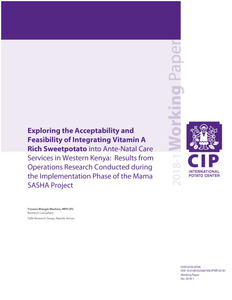Background and Objectives: This study presents findings on
the acceptability and feasibility of an integrated nutrition,
agriculture and health intervention that delivers vitamin A
rich, orange-fleshed sweetpotato (OFSP), through Antenatal Care (ANC) services with the goal of improving the
health and nutrition of pregnant women and their infants in
Western Kenya.
Methods: We explored the feasibility and acceptability of
the intervention through 42 interviews with nurses,
Community Health Extension Workers (CHEW), vine
multiplers (VM), agriculture extension agents, both from the
Ministry of Agriculture (MoA) and non-Governmental
Organization (NGO) partners, and district-level health and agriculture officials as well as Chiefs; and
24 focus group discussions with Community Health Workers (CHW), pregnant and lactating women,
and their husbands. Qualitative data was transcribed verbatim and analysed using NVivo 10.0.
Content analysis was used to identify key topics, relational analysis to examine relationships between
themes and respondents.
Results: Enhanced maternal and child health coupled with food security were the most recognized
benefits by respondents. Mothers felt their children were less susceptible to disease and more
energetic; they and their partners also valued OFSPs’ shorter maturity and higher yields. Frontline
health workers perceived higher ANC attendance and increased contact between mothers, their
partners and children with the health system. All implementers were motivated by enhanced
training, more effective nutrition messaging, tangible recommendations to improve dietary quality,
community recognition, and ability to better serve their clients. CHWs emerged as key facilitators of
implementation and outreach to mothers. Challenges to implementation and uptake included
mothers’ distance to ANC and VMs, misperceptions such as OFSP having contraceptive properties,
the need for continuous community sensitisation, and increased workload without commiserate
remuneration for CHWs and VMs.
Conclusions: Perceived benefits and motivating factors among key stakeholders outweighed
challenges of integrating OFSP with ANC services. These findings contribute to other evaluation
activities that assess effectiveness, feasibility and acceptability of this integrated agriculture and
health intervention.
Exploring the Acceptability and Feasibility of Integrating Vitamin A Rich Sweetpotato into AnteNatal Care Services in Western Kenya: Results from Operations Research Conducted during the Implementation Phase of the Mama SASHA Project
Citation: Machira, Y.W. (2018). Exploring the Acceptability and Feasibility of Integrating Vitamin A Rich Sweetpotato into AnteNatal Care Services in Western Kenya: Results from Operations Research Conducted during the Implementation Phase of the Mama SASHA Project. Social Sciences Working Paper 2018-1. Lima, Peru: International Potato Center.
2021-05-26
FOOD SECURITY, GENDER, IMPACT ASSESSMENT, INCLUSIVE GROWTH, , SWEETPOTATO AGRI-FOOD SYSTEMS, SWEETPOTATOES
Kenya
working_paper

